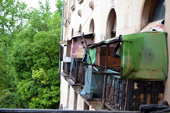
Invisible society
By Tatia Megeneishvili
Monday, May 19
One of the very first wave of internally displaced people (IDP) lost their homes in 90’s and have since lived in awful conditions. One of such places where forgotten people live is Sanatorium Metallurg, in Tskhaltubo.
They have have been living in these conditions for 22 years. The residents of Sanatorium have appealed to many agencies for help many times, but in vain.
The main source of income for families in Sanatorium is government aid (45 GEL).
“This money is not enough, neither for food nor for medicine. Plus money is paid for electric energy meters. How are we supposed to pay for it? We don’t have water or gas, even animals live in better conditions,” stated Nino Arjevanidze, a resident of Sanatorium.
“All who had the possibility have already left this place. The commission has already been at this place. They gave scores to each family and later gave flats to some people. We have no idea what the criteria was, because people who had alternative places already were chosen and ones who were here were left just like this,” explains Dali Zhvania, a resident of Sanatorium.
However, not having enough resources is not the main problem for these people. The main problem is that the building is in a catastrophic condition. The roof is damaged and the basement is full of sewerage water, because the sewage system has been broken for years. The building has a terrible smell so it is impossible to stay on the lower floors.
“If no one helps to solve this problem soon, it may cause the spread of infectious diseases. Bathrooms are also in awful condition. People are taking bath on balconies, with water collected during rains. It must not continue any longer!” stated Sophio Khubaneishvili, representative of Georgian Young Lawyers’ Association (GYLA).
Deputy Governor of the Ministry of Internally Displaced Persons from the Occupied Territories, Accommodation and Refugees of Georgia Imereti, Guria, Rach-Lechkhumi and Kvemo Svaneti Regional Office Tengiz Aslanikashvili, stated that they are working on solving these problems.
“We have a long-term strategy for the IDPs. The construction of new buildings have already been launched. We hope someday, all of those people will have their own homes,” stressed Aslanikashvili.
“This strategy is called long-term because it is impossible to be completed in a short period of time,” stated Giorgi Koridze, elder specialist of the same office.
According to Aslanikashvili, he knows about the sewage system problem.
“We cleaned that place once already, and solved the problem as much as it was possible, but some problems still exist,” he stressed.
Under the new law, a refugee who is seeking an apartment must fill out the questionnaire form, which later will be discussed by a commission before deciding who will receive a new home.
The material was prepared within media tour, within the framework of the Regional Civil Society network (R-CSN) and facilitated by the non-governmental organization CIDA.

